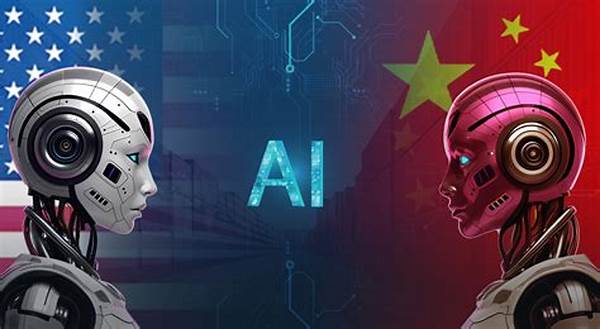Why AI Influences Global Power Dynamics
Read More : The Role Of Ai In Environmental Protection
In the bustling corridors of the digital world, AI is no longer just a concept from futuristic novels but a palpable force that is transforming the global landscape of power and influence. Imagine a world where machines possess the agility of human thought, capable of analyzing, predicting, and executing tasks that were once realm of human expertise. Welcome to the era where AI influences global power dynamics, reshaping industries, redefining wars, and redrawing borders of influence. This isn’t just about technology; it’s about the profound implications on international relations and global governance.
With AI, countries stand on the precipice of a revolution—a revolution that isn’t fought on traditional battlegrounds but in the corridors of cyberspace. As AI continues its inexorable march into domains like healthcare, cybersecurity, finance, and warfare, it grants unprecedented power to those who wield it wisely. It’s akin to holding the rebirth of the Industrial Revolution, but with added complexities and opportunities.
The allure of AI stretches beyond its capabilities. For nations, it’s the key to not just economic prosperity but geopolitical dominance. The ability to collect, analyze, and act on vast sets of data swiftly has monumental implications. Countries investing heavily in AI are not just nurturing technology; they are securing seats at the table of future global discourse. The digital arms race is on, and the stakes are higher than ever. This is the age of cerebral power, where algorithms dictate terms, and data-driven insights shape the rhetoric of international politics.
As the dust settles, why AI influences global power dynamics becomes glaringly clear. From a marketing perspective, AI offers the ultimate unique selling proposition—a tool that promises to revolutionize industries while simultaneously restructuring the zeitgeist of global authority.
AI’s Role in Shaping International Relations
AI’s foray into global power dynamics is not merely about technology; it’s actively reshaping international alliances. Countries that were once on opposing ends now find themselves aligned by shared AI interests. The collaborations fostered by AI research and development transcend traditional borders. Take, for instance, the AI-enhanced military strategies. Countries leverage AI to predict conflicts and design proactive measures, reducing the likelihood of physical wars. It’s a classic tale of interest aligning with action—where desire for mutual benefit supersedes historical grudges.
In business, AI is a formidable force, transforming market strategies, consumer interactions, and brand building. AI-driven analytics enable companies to personalize experiences like never before—a direct play on consumer desires, driven by intelligent algorithms. This is the new language of business, where AI-generated insights outshine human intuition.
And yet, with great power comes great responsibility. The ethical considerations of AI deployment raise significant debates. As AI becomes a staple in global arenas, countries grapple with ensuring ethical use, privacy preservation, and minimizing biases. These challenges, though daunting, shape the discourse in boardrooms and political halls alike. These are the crossroads where technology meets conscience, and nations must tread with wisdom.
The Future of AI in Global Politics
As AI’s reach expands, so does its potential to redefine global power structures. Imagine a world where political campaigns are AI-driven, where decisions are not just evidence-based but also predictive. The possibilities are dizzying. With AI, the future isn’t just arriving; it’s happening now. The nations that master AI technologies today will likely be the superpowers of tomorrow.
The story of AI in global politics is a narrative still being written. It involves complex characters—countries, corporations, individuals—and the stakes are phenomenally high. Contribution to AI research now translates to a seat in shaping the future. This stage is not just for the giants but also the keen, the innovative, and the bold.
As we witness this unfolding play, it’s crucial to ask ourselves—how are we preparing for this future? Are we setting the stage for an equitable, beneficial AI-driven world, or are we simply spectators, hoping for the best? By understanding and actively engaging with these dynamics, we not only prepare for the changes AI brings, but we also steer the direction of this wave towards a prosperous horizon for all.
How AI Transforms Global Economic Structures
Understanding AI’s Economic Impact
AI is a game-changer in global economic frameworks, reshaping the traditional paradigms of industries around the world. As we explore why AI influences global power dynamics, the economic impact becomes increasingly evident—a topic worthy of closer inspection.
Countries are leveraging AI to enhance productivity, optimize resources, and foster innovation across various sectors. AI’s predictive capabilities allow for more efficient resource allocation, leading to cost reductions and better decision-making processes. As organizations improve their supply chains and business operations through AI, they secure competitive advantages on an international scale.
Moreover, the economic influence of AI extends into labor markets, where automated processes transform job landscapes. While there are concerns about job displacement, AI also creates new roles, especially in tech development, maintenance, and oversight, catalyzing growth in these new segments. Therefore, the interplay between AI and economic power dynamics is critical to understanding its global influence.
AI’s Strategic Role in National DefenseInnovating Military Strategies with AI
A strategic dimension of AI lies in national defense, and understanding why AI influences global power dynamics involves recognizing its profound impact on military strategies. Governments globally are investing in AI for defense applications, innovating strategies, and reshaping security models.
AI technologies enhance surveillance, reconnaissance, and decision-making processes within military operations. Advanced AI algorithms process vast data to predict threats and simulate outcomes, allowing nations to respond proactively to potential conflicts. This strategic advantage renders AI an indispensable component in modern defense arsenals.
Furthermore, AI’s role in cybersecurity cannot be overstated. As cyber threats become more sophisticated, AI’s capacity to detect anomalies and mitigate risks becomes invaluable, bolstering national security frameworks. Consequently, AI’s deployment within defense sectors not only reinforces a nation’s military capabilities but also influences global security dynamics.
Five Key Aspects of AI Influencing Global Power Dynamics
Discussion on AI’s Influence in Global Power
The influence of AI in transforming global power dynamics is profound, permeating every facet of international politics, economics, and military strategies. It’s an era marked by unprecedented technological advancements where the stakes have never been higher. The future power structures are coded in lines of AI algorithms, and those who master it today are setting the blueprint for tomorrow’s geopolitics.
One of the pivotal aspects of why AI influences global power dynamics is its ability to enhance or reshape military strength. Nations are investing heavily in AI to not only augment their defense capabilities but also to cement their status as formidable powers on the world stage. The precision and predictive prowess of AI-defined warfare redefine the traditional paradigms of conflict, limiting human involvement and potentially reducing casualties. However, this raises significant ethical questions that need addressing to avoid potential misuse.
Equally significant is AI’s role in economic leadership. Countries that harness AI effectively gain substantial economic leverage, driving technological progress and fostering innovation. This economic edge often translates into political influence, enabling these nations to steer global policies to their advantage. Amidst this evolving landscape, the responsibility lies with global leaders to ensure equitable access to AI technologies, fostering an inclusive future where AI benefits extend beyond political and economic elites.
The Role of AI in Global Strategy Formulation
AI as a Tool for Strategic Influence
In the realm of global strategy, AI is emerging as a pivotal tool for strategic influence, providing insights and formulating directions that were previously unattainable. When delving into why AI influences global power dynamics, its ability to simulate complex scenarios and project potential outcomes is instrumental for strategic decision-making.
Strategically, AI empowers nations by enhancing predictive analytics capabilities. Governments can model economic, political, and social scenarios, preparing for diverse outcomes, and formulating robust strategies. This proactive approach enables them to navigate global uncertainties with confidence and precision, asserting their influence on the world stage.
Moreover, AI fuels diplomatic exploits, allowing nations to negotiate from informed positions backed by data-driven insights. This advantage is particularly evident in trade negotiations, environmental policies, and resource management, where data accuracy can be the difference between a favorable or adverse outcome. Thus, AI doesn’t just inform strategy; it defines it, underpinning its critical role in shaping global power dynamics.
AI’s Influence on International Policy
In the sphere of international policy, AI’s impact is increasingly prominent. The integration of AI in policy formulation and execution transforms how nations interact on global platforms. Understanding why AI influences global power dynamics elucidates its capacity to redefine international norms and regulations.
AI facilitates collaborative governance models, enabling nations to address global challenges such as climate change, cybersecurity, and human rights efficiently. By harmonizing global data collection and analysis efforts, AI-driven policies promote shared goals and foster international cooperation. This collaborative dynamic enhances global unity and minimizes conflict, offering a compelling narrative for AI’s role in shaping global power.
Furthermore, AI’s influence on policy transcends national borders, encouraging the establishment of frameworks aligning with ethical and equitable principles. Through international forums and alliances, AI promotes the development of regulatory standards ensuring responsible AI usage, balancing power dynamics and promoting global justice and cooperation.
Six Explanatory Points on AI’s Global Influence
The widespread integration of AI in international frameworks accelerates technological diplomacy and collaborative governance. Through shared research, knowledge exchange, and technological collaboration, AI becomes a bridge for unity, redefining how countries wield influence on the global stage. Institutions and countries are increasingly adopting AI-supported strategies not just as a path to advancement but as a requisite component in their arsenal of diplomatic tools.
Narratives of AI fostering a cohesive global community abound. Its ability to bridge knowledge gaps and facilitate shared learning encourages cooperation in tackling grave challenges, from climate change mitigation to addressing health crises. Consequently, technological boundaries blur, forging connections where once there were divides.
However, while AI holds promise, nations must remain vigilant against potential risks. Ethical considerations remain paramount, ensuring AI development is pursued responsibly and inclusively. Transparency, fairness, and non-bias principles should underpin policies, maintaining global harmony and safeguarding equality. It’s a delicate dance of progress and caution—a testament to humanity’s ability to guide innovation for the collective good.
How AI is Reshaping International Competitiveness
Leveraging AI for a Competitive Edge
In the global arena, AI is rapidly becoming synonymous with competitiveness. Nations and corporations alike recognize the unparalleled edge AI provides, shaping market strategies and economic power structures. Understanding why AI influences global power dynamics emphasizes AI’s capability to redefine competition paradigms.
AI enables countries to outpace rivals by optimizing everything from research and development to market execution. In industries where precision and speed are pivotal, AI delivers decisive advantages. As industries revolutionize processes through AI, they secure dominant market positions, enhancing their influence and undermining traditional competitors.
Moreover, AI accelerates technological innovations, often leveling the playing field for emerging markets seeking to assert their global presence. By adopting AI solutions, countries can bypass traditional growth barriers, assert their competitiveness, and redefine their influence trajectory. As AI democratizes access to technology, it reconfigures global balances, fostering a more interconnected, competitive ecosystem.
Promoting Equitable AI Development
To harness AI’s potential fully, global stakeholders must advocate for equitable AI development and deployment. It’s essential to ensure AI technologies benefit all, transcending geographical and economic divides. Structured collaborations between tech giants, governments, and educational institutions play a vital role in promoting fairness in AI adoption globally.
For countries at technological crossroads, investment in AI education and infrastructure becomes imperative. New generations equipped with AI expertise contribute to developing sustainable economies, reinforcing the country’s standing on the global stage. As these efforts unfold, they form a virtuous cycle, bolstering collective growth and amending historical divides.
Nevertheless, with technological prosperity comes responsibility. Stakeholders must navigate AI’s potential biases and ethical dilemmas diligently, ensuring development paths are just and inclusive. Responsible leadership charting equitable AI futures not only upholds global justice but also guarantees sustainable progress, demonstrating why AI influences global power dynamics profoundly.
By embracing the transformative potential of AI, we open doors to unprecedented advancements while committing to ethical stewardship—a collective endeavor showcasing the best of our shared technological future.


